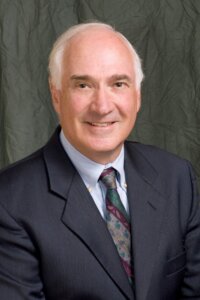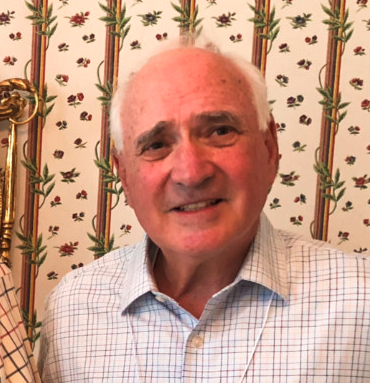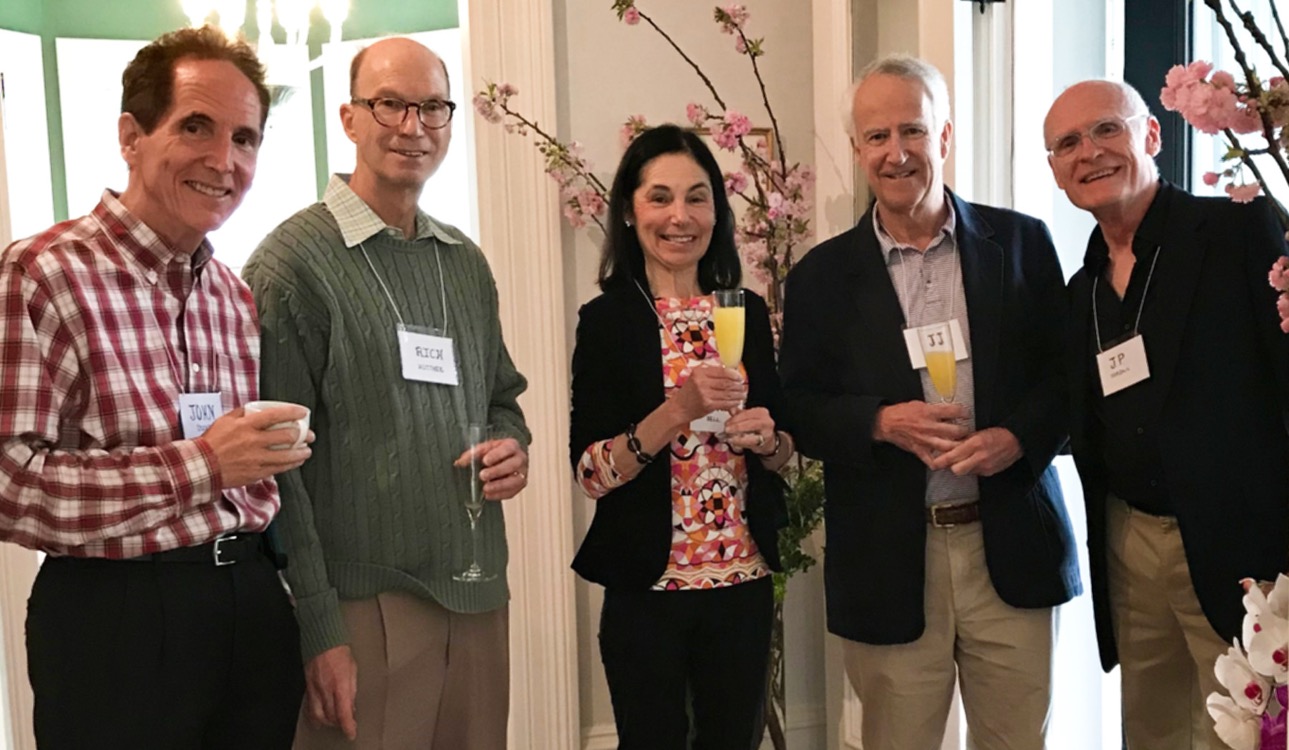Joseph Green, August 17, 2022
(from Legacy.com)
 GREEN, Joseph Benjamin Of Cambridge, Massachusetts, passed away on August 17, 2022 at 74 from pancreatic cancer.
GREEN, Joseph Benjamin Of Cambridge, Massachusetts, passed away on August 17, 2022 at 74 from pancreatic cancer.
An accomplished attorney and tennis player, Joe was known for his integrity and agility, both in court and on the court.
Born in 1947 in New York City, Joe attended Horace Mann School for junior high and high school, followed by Yale University, where he majored in American studies. Upon graduation in 1969, he completed one year at Harvard Law School. He then took a four-year hiatus, during which he served on the Washington, D.C. police force and won a grant from the National Endowment for the Humanities to study the French police. But, as it turned out, the French police did not want to be studied.
All was not lost, however, as he met his future wife, Carol (a fellow New Yorker), in Paris, where she had been working as a textile designer. After embarking on a three-month backpacking trip through Southeast Asia, Joe and Carol returned to the United States, and he completed the last two years of Harvard Law School, graduating in 1976.
Shortly after his law school graduation, Joe and Carol married. Together they have three children, Jeff, Ariana, and Nick. Jeff and his husband, Adam, live in Scottsdale, Arizona, and have two sons, Zac and Ethan. Ariana and her husband, Sam, live in Scarsdale, New York, and have three children, Jella, Jake, and Ezra. Nick lives between New York City and Cambridge, where he has been assisting with Joe’s care since his diagnosis.
Joe’s law career spanned over 40 years, beginning when he joined Hutchins & Wheeler, a Boston law firm. Always drawn to public service, he left private practice and spent the next decade serving as Chief District Court Prosecutor and Director of Policy and Planning for Essex County, Massachusetts.

In 1989, Joe returned to private practice, joining the Boston law firm of Kotin, Crabtree & Strong, and soon became a partner. His practice areas included special education, personal injury, criminal law, and disability rights. In addition, he authored a book and several articles on evidence, trial practice and procedure, and criminal law.
Outside of the office, Joe was an advocate for disability rights and served on the board of the Massachusetts Branch of the International Dyslexia Association.
Joe was an avid tennis player. He played every Tuesday evening with a steady group of friends for more than 30 years and was a loyal member of the Cambridge Tennis Club, where he also served on the board. He and his son Nick won the father-son doubles championship in 2009. He also won the men’s doubles championships in 2002 and 2006.
Joe always looked forward to his weekly golf outings, which occurred on the many Wednesday afternoons he and his golf group took off from work to hit the links. In addition to the local greens, they also enjoyed traveling to play courses across the United States and in other parts of the world.
Joe was a beloved son of Ruth Finley Lein, the founder and publisher of The Fashion Calendar, and of Hank Green. He is survived by his brothers, Jim Green of Brewer, Maine, and Larry Lein of Cresskill, New Jersey. There will be a memorial service in September, the time and date to be announced. In lieu of flowers, donations in memory of Joseph B. Green can be made to the ACLU of Massachusetts: https://bit.ly/JoeGreenTribute
Published by Boston Globe from Aug. 17 to Aug. 18, 2022.

Here is Joe’s 50th reunion essay:
In the Spring of 1970, I saw a notice in the Boston newspaper that the Metropolitan Police Department in Washington, D.C. was recruiting nationwide and conducting interviews in Boston. Being in a federal city whose employees were at that time paid entirely by the U.S, Treasury, Washington D.C.’s Metropolitan Police was not hampered by budget freezes and, with the highest crime rate in the country at that time, had just been authorized to double the size of the police department (from 2500 to 5,000) after a Congressman had been robbed and his secretary assaulted on the streets of D.C. near the Capitol. Since the interview and the physical were being offered in the Boston area, I applied and was accepted (they were desperate to meet their quota for recruits), and besides, the NYPD had not come through. I finished the year at law school before reporting to the Police Academy in D.C.
Joining the police department was not an attempt to avoid being drafted for Vietnam, since there was now a lottery system with no deferments. (I was number 301 and they got up to 295 the following year). The aggressive recruitment created interesting changes in the Metropolitan Police Department in the early 1970’s. They were so desperate to get bodies on the street that not only did they accept Ivy League graduates, they also offered a 180-day early discharge to soldiers on active duty in Vietnam if they joined the D.C. Metropolitan Police Department. In addition, and even more game-changing, the recruiters were instructed to ensure that the new class of recruits was 50% African-American, whereas the D.C. Metropolitan Police Department had always had an unofficial quota of 10% African-American (even though Washington, D.C. was about 70% African-American).
Because of this new racial mix, many of the experienced white officers, many of whom were from the South, either resigned or asked for reassignment from the precincts to the detectives. This left the precincts with all new, young officers, a situation which, on the one hand meant there was no pressure to conform to bad or corrupt practices; on the other hand, there were no good models to emulate, because virtually everyone was new. Most new police officers, like me, had no idea how to get from place to place in D.C., so giving directions to tourists was quite problematical in this time before GPS.
Even with the integration of the police department, officers lined up for roll call with black officers on one side and white officers on the other side. I frequently lined up on the non-white side just to see what would happen. Interestingly, nobody ever said anything about it. There was no overt racism, since 50% of the recruits were African-American and most career officers had left the precincts.
I learned a lot as a police officer about police and inner-city life. My patrol area still had boarded up storefronts from the 1968 riots after the assassination of Martin Luther King. As a police officer, you see people at their worst—lots of domestic abuse and alcohol and drug problems. We often could not even attend to all the calls for armed robberies and assaults. There were some humorous times too. One of my Yale roommates, John Mazer, came down to march in the anti-war Moratorium. He stayed with me and we rode downtown together. John got out on one side of the street to march and I got out on the other side to guard the government office buildings. I was not involved in the 10,000 arrests (many of those arrested were later compensated in civil suits).
As police officers move up in seniority, they take exams to get promotions and higher pay, which usually means desk jobs, which is what they want. I learned that most police do not want confrontations and almost from the start, they talk about pensions and retirement. However, I figured if I was going to have a desk job, I didn’t need to be in the police department. So, after three years on street patrol, I decided it was time to move on. A friend, who was an academic, said I should apply for a grant, and she told me to apply to the National Endowment for the Humanities because they had a Younger Humanist Fellowship which was not for academic credit and for which no academic paper was required to be written. I thought the idea was ridiculous but I put in for a grant to study the French police. Hey, why not? I had worked for an American company in Paris after my freshman year at Yale, so I had been looking for an excuse to go back to Paris. To my amazement I got the grant.

